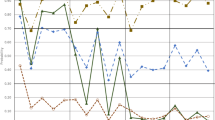Abstract
The influence of class, race, sex, and educational status on ways of handling aggression and temper control were studied by means of responses to open- and closed-ended questions. The sample consisted of 1844 inner-city youth in two northern cities. Race was found to be the only important discriminator: blacks were less aggressive and exhibited more temper control than whites, but once aggression occurred blacks were more likely than whites to assault others.
Similar content being viewed by others
References
Berkowitz, L. (1969). The frustration-aggression hypothesis revisited. In Berkowitz, L. (ed.),Roots of Aggression: A Re-examination of the Frustration-Aggression Hypothesis, Atherton, New York.
Berkowitz, L., and Green, R. G. (1966). Film violence and cue properties of available targets.J. Personal Soc. Psychol. 5: 364–368.
Berkowitz, L., and Green, R. G. (1967). Stimulus qualities of the target of aggression: A further study.J. Personal Soc. Psychol. 5: 364–368.
Berkowitz, L., and Knurek, D. A. (1969). Labor mediated hostility generalization.J. Personal Soc. Psychol. 13: 200–206.
Clark, B. M. (1959). Color, class, personality and juvenile delinquency.J. Negro Educ. 28: 240–281.
Davis, A. (1944). Socialization and adolescent personality. InAdolescent Forty-third Year Handbook, Part I, National Society for Study of Education, Chicago Press, Chicago.
Dollard, J. (1939).Frustration and Aggression. Yale University Press, New Haven, Conn.
Ferdinand, T. N., and Luchterhand, E. (1970). Inner city youth, the police, the juvenile court and justice.Soc. Probl. 17: 510–527.
Goff, M. B. (1950). Problems and emotional difficulties of Negro children due to race.J. Negro Educ. 19: 152–158.
Hindman, B. M. (1953). The emotional problems of Negro high school youth which are related to segregation and discrimination in a southern urban community.J. Educ. Sociol. 27: 115–127.
Johnson, R. B. (1957). Negro reactions to minority group status. In Barron, M. L. (ed.),American Minorities, Knopf, New York.
Kardiner, A., and Ovesey, L. (1951).The Mark of Oppression: A Psycho-social Study of the American Negro, Norton, New York.
Karon, B. P. (1958).The Negro Personality, Springer, New York.
Lesser, G. S. (1959). The relationship between various forms of aggression and popularity among lower-class children.J. Educ. Psychol. 50: 20–25.
Meyer, T. (1972). Effects of viewing justified and unjustified film violence on aggressive behavior.J. Personal Soc. Psychol. 23: 21–29.
Mussen, P. H. (1953). Differences between the TAT responses of Negro and white boys.Consult. Psychol. 17: 373–376.
Pettigrew, T. F. (1964).A Profile of the Negro American. Van Nostrand, New York.
Weller, L., and Luchterhand, E. (1975a). Adolescents' perceptions of their parents by social class, race and parental presence.Int. J. Marriage Family (in press).
Weller, L., and Luchterhand, E. (1975b). Adolescents' perceptions of their parents.Adolescence (in press).
Author information
Authors and Affiliations
Additional information
Area of specialization is social psychology. Currently working on an interpretation case history of a holocaust episode in a rural German community.
Area of specialization is social psychology. In Israel has studied the effects of ethnicity on a number of attitudinal and behavioral variables.
Rights and permissions
About this article
Cite this article
Luchterhand, E., Weiler, L. Effects of class, race, sex, and educational status on patterns of aggression of lower-class youth. J Youth Adolescence 5, 59–71 (1976). https://doi.org/10.1007/BF01537084
Received:
Issue Date:
DOI: https://doi.org/10.1007/BF01537084




